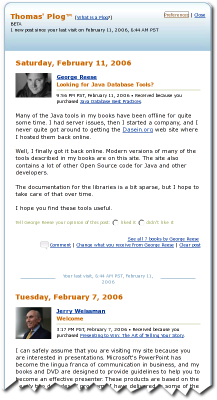Recently I visited Amazon.com and was assaulted by a fat stream of marketing blurbs. Amazon tried to convince me that I was actually enjoying an innovative blog written by my favorite authors, each trying to “connect” with me, but I found the attempt to be shallow and annoying. To me, it was still a fat stream of marketing blurbs.
And what do the marketing wizards at Amazon call this blurb stream? Your Plog.

Amazon explains it like this:
Your Plog. Your Amazon.com Plog is a personalized web log that appears on your customer home page. Every person’s Plog is different (hence the name) and just like a blog, your Plog is sorted in reverse chronological order. Each post also gives you the opportunity to provide feedback to the sender as to whether you liked the post or not. This feedback loop means your Plog becomes even more relevant and interesting over time. Your Plog will appear if you are logged into our web site and is visible only to you.
I explain it like this:
Your Plog. Amazon.com thinks you want your time and attention delivered to every guy who wrote a book that you somehow indicated interest in. You don’t. Your favorite authors already have blogs, and you already subscribe to the ones you care about. As a result, Your Plog contains nothing but stuff you don’t care about and stuff you might have cared about, had you not read it five times already from other sources. It is an annoying waste of your time and attention, foisted on you by the ravenous marketing weasels at Amazon.com.
For example, whenever the Pragmatic guys come out with a new book on Ruby or Rails, I hear about it from Andy Hunt’s blog, Dave Thomas’s blog, the Riding Rails blog, emails from Andy, ruby-talk postings from Dave, and now – thanks to “my” Plog – Amazon’s home page. (In fact, my Plog contains no fewer than three blurbs from the Pragmatic guys – all stuff I have seen before. I like the Pragmatic Programmers and think Andy and Dave are good guys, but I don’t see what they gain by being associated with Amazon’s Plog-based marketing.)
Other takes on the Plog
Here’s what other people are writing about Plogs. From Changing Way:
When I go to amazon.com these days, I’m shown a “plog.” What does this ugly term mean? It told that it denotes a weblog personalized to me. What it turns out to be is a blog by someone I bought a book from years ago. I’ve nothing against this person or her book. Neither do I think that her blog is bad. It’s just not of interest to me, and so doesn’t belong on Amazon’s home page, or on my “personalized” version of it.
From FactoryCity comes a post entitled Ohmifrog, Amazon, cut it out!
And here’s my gripe: a “plog(tm)” – if that’s really the best you could come up with – and if it’s supposed to inherit anything from its “blog” heritage – should be about original authorship, not about having other people’s content thrown at you.
Amy Gahran has a more analytical consideration of Plogs in Amazon ‘Plogs’ – What Do You Think?:
I think the idea of plogs may have great potential for relationship-building, if implemented carefully and with an eye toward timeliness and relevance. But frankly, this Amazon implementation feels off-base to me so far…. Well, [an author’s participating in Plogging] could be terrific or terrible, depending on the content quality and relevance [of the author’s contributions].
Bingo. That’s why Amazon’s Plog concept will remain more annoying than useful. Authors do not want Amazon to own what they consider to be their conversations, and thus the Plog will be used as little more than a marketing mailing list.
Authors do not want Amazon to own the conversation
It’s the quality of the conversation that counts, and smart authors will not want their conversations to be confined to Amazon. Instead, they will set up their own sites where they can have greater freedom and greater control. That’s where the authors will open themselves to honest conversation, and that’s where the best stuff will occur.
Amazon’s Plogs will get the scraps – bits of the real conversation that have been converted into marketing blurbs and pushed down the Plog channel. In fact, it already seems to be going that way: a lot of “posts” in my Plog appear to have been recycled from real blogs or web sites.
Amazon, count me out
Even though my immediate reaction to discovering “my” Plog was mild disgust, I did try to give it a chance. After having given it a week to grow on me, I am convinced that I want nothing to do with my Plog. It wastes my time and attention and gives me little in return.
Did Amazon Plog you yet? If so, what do you think?